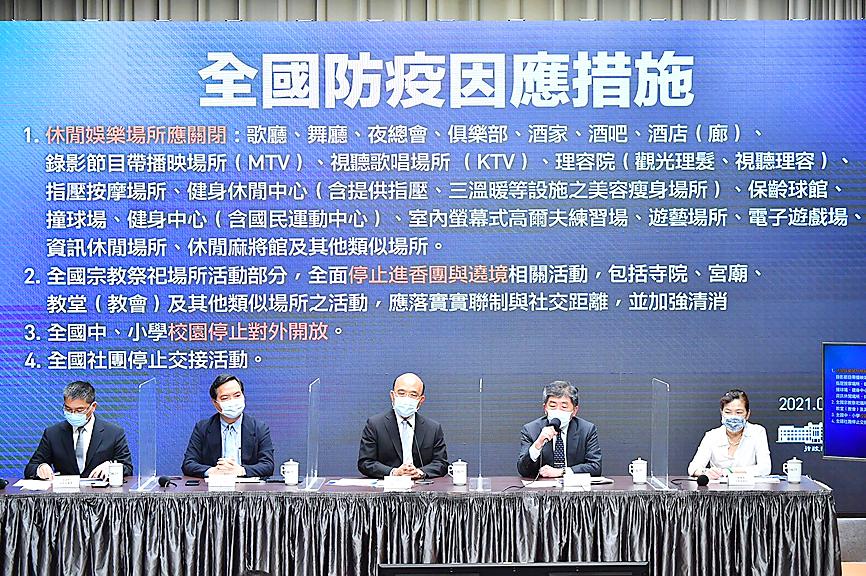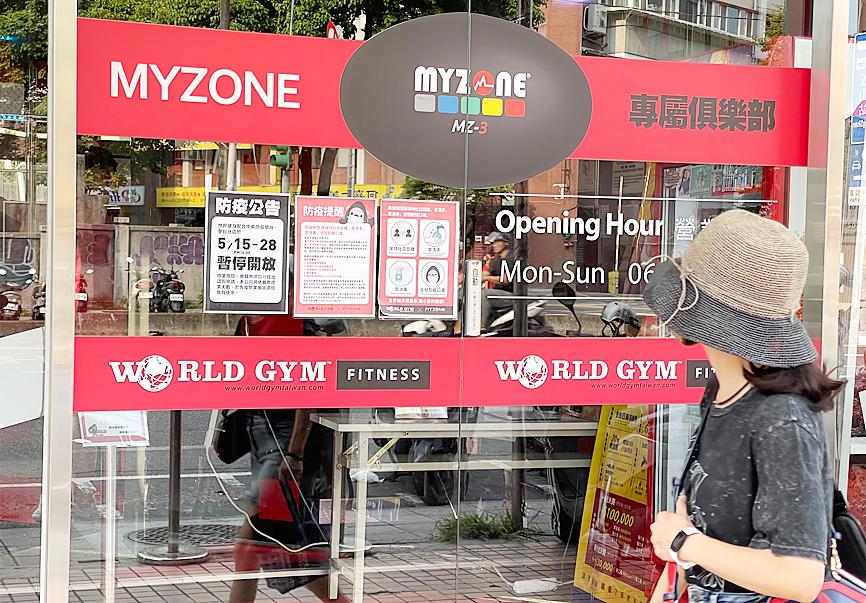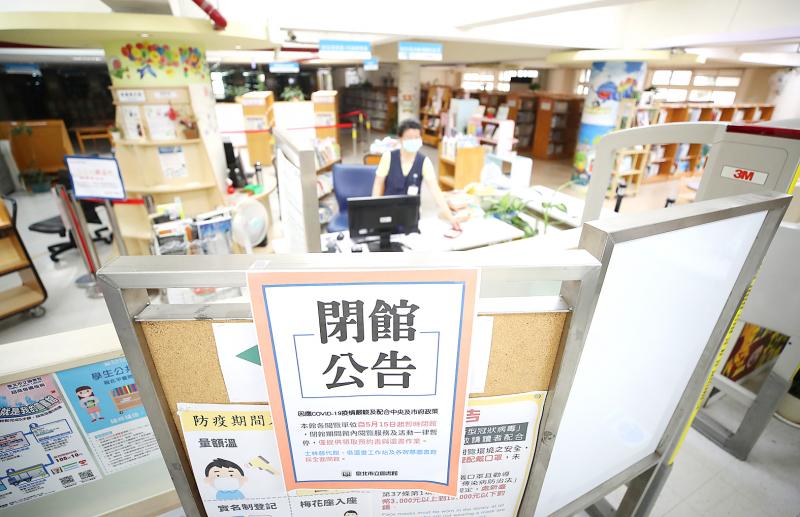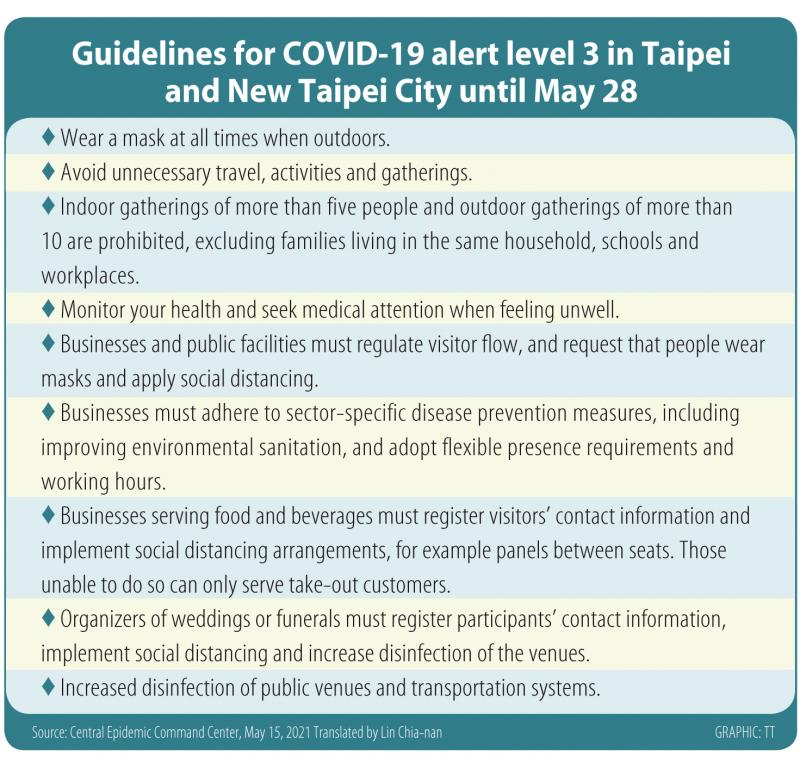The Central Epidemic Command Center (CECC) yesterday raised the COVID-19 alert for Taipei and New Taipei City to level 3 in light of surging cases in the two cities.
The enhanced disease prevention measures for level 3 are to be implemented until May 28, Minister of Health and Welfare Chen Shih-chung (陳時中), who heads the center, told a morning news conference at the Executive Yuan in Taipei.
With 180 locally transmitted cases confirmed yesterday, Premier Su Tseng-chang (蘇貞昌) said that the government must take immediate action to protect the public, referring to measures stipulated in the Communicable Disease Control Act (傳染病防治法).

Photo courtesy of the Executive Yuan
Other counties and cities remain at level 2 alert, the authorities said, adding that unnecessary travel between areas at level 2 and level 3 is to be avoided.
Chen said that the test positivity rates in hot spots in Taipei and New Taipei City has increased over the past few days, ranging from 3 to 10 percent, adding that there is a “rather high infection risk” in the two cities.
“The current approach of using contact tracing to contain the spread of the virus might have limited effect, so we need to take community disease prevention measures and raise the COVID-19 alert level to effectively control this outbreak,” Chen said.

Photo: CNA
Disease prevention measures to be implemented nationwide include closing recreational facilities, banning pilgrimages and related activities, closing junior-high and elementary school campuses to visitors, and suspending some activities of social clubs.
The recreational facilities include cabarets, dance halls, night clubs, clubhouses, hostess bars, pubs, KTV and MTV lounges, barber shops, massage parlors, recreational centers (including massage, sauna and spa facilities), bowling alleys, billiard rooms, fitness centers (including civil sports centers), indoor golf practice facilities, game centers, amusement arcades, Internet cafes, gambling houses and similar facilities.
Chen said that although the majority of the confirmed local infections are in Taipei and New Taipei City, recreational facilities would be closed across the nation to avoid people traveling to facilities in other cities and counties.

Photo: CNA
While pilgrimages and related activities would be canceled, other religious activities would be allowed if they comply with registration and social distancing rules, as well as increased disinfection measures, he said.
Entertainment facilities in Taipei and New Taipei City had been ordered to close from 4pm on Friday, he said.
The facilities include movie theaters, assembly halls, stadiums, activity centers, performance venues (including music halls, auditorium halls, museums, exhibition halls, history museums, memorial halls), indoor skating rinks, indoor swimming pools, amusement parks, children’s playgrounds and similar venues, Chen said.

Educational facilities, including community colleges, senior learning centers, training centers, study centers, social education institutes (including social educational centers, science education centers and libraries) and senior meal-sharing venues also had to close, he said.
“The general principle is to reduce people flow and the size of gatherings, implement contact info registration, follow business continuity guidelines, and thoroughly practice the new disease prevention lifestyle,” Chen said.
Additional enhanced disease prevention measures for Taipei and New Taipei City include: a mask mandate at all times when leaving your home; no unnecessary travel, events or gatherings; and the suspension of social gatherings of more than five people indoors and more than 10 people outdoors, excluding families living in the same household.
The measures also include that people should monitor their health and contact a health department for testing immediately or seek medical attention if symptoms occur; businesses and government facilities should implement crowd control, a mask mandate and social distancing rules.
Companies should follow business continuity guidelines to manage employees’ personal and workplace hygiene, and launch responsive measures, such as staggered operation, remote working or flexible working hours; restaurants must register the contact information of visitors, implement a social-distancing regime by, for example, using panels to separate visitors, or only allow take-out customers.
Weddings or funerals are also required to register the contact information of participants, and implement social distancing and disinfection measures.
Public venues and means of public transportation would be cleaned and sanitized more often, Chen said.
People who refuse to wear a mask after being asked would be fined NT$3,000 to NT$15,000, he said.
Those who contravene restrictions on gatherings or religious events, and businesses that fail to suspend operations if they are ordered to do so would be fined NT$60,000 to NT$300,000, Chen said.

TRUST: The KMT said it respected the US’ timing and considerations, and hoped it would continue to honor its commitments to helping Taiwan bolster its defenses and deterrence US President Donald Trump is delaying a multibillion-dollar arms sale to Taiwan to ensure his visit to Beijing is successful, a New York Times report said. The weapons sales package has stalled in the US Department of State, the report said, citing US officials it did not identify. The White House has told agencies not to push forward ahead of Trump’s meeting with Chinese President Xi Jinping (習近平), it said. The two last month held a phone call to discuss trade and geopolitical flashpoints ahead of the summit. Xi raised the Taiwan issue and urged the US to handle arms sales to

A magnitude 5.6 earthquake struck off the coast of Yilan County at 12:37pm today, with clear shaking felt across much of northern Taiwan. There were no immediate reports of damage. The epicenter of the quake was 16.9km east-southeast of Yilan County Hall offshore at a depth of 66.8km, Central Weather Administration (CWA) data showed. The maximum intensity registered at a 4 in Yilan County’s Nanao Township (南澳) on Taiwan’s seven-tier scale. Other parts of Yilan, as well as certain areas of Hualien County, Taipei, New Taipei City, Taoyuan, Hsinchu County, Taichung and Miaoli County, recorded intensities of 3. Residents of Yilan County and Taipei received

Taiwan has secured another breakthrough in fruit exports, with jujubes, dragon fruit and lychees approved for shipment to the EU, the Ministry of Agriculture said yesterday. The Animal and Plant Health Inspection Agency on Thursday received formal notification of the approval from the EU, the ministry said, adding that the decision was expected to expand Taiwanese fruit producers’ access to high-end European markets. Taiwan exported 126 tonnes of lychees last year, valued at US$1.48 million, with Japan accounting for 102 tonnes. Other export destinations included New Zealand, Hong Kong, the US and Australia, ministry data showed. Jujube exports totaled 103 tonnes, valued at

BIG SPENDERS: Foreign investors bought the most Taiwan equities since 2005, signaling confidence that an AI boom would continue to benefit chipmakers Taiwan Semiconductor Manufacturing Co’s (TSMC, 台積電) market capitalization swelled to US$2 trillion for the first time following a 4.25 percent rally in its American depositary receipts (ADR) overnight, putting the world’s biggest contract chipmaker sixth on the list of the world’s biggest companies by market capitalization, just behind Amazon.com Inc. The site CompaniesMarketcap.com ranked TSMC ahead of Saudi Aramco and Meta Platforms Inc. The Taiwanese company’s ADRs on Tuesday surged to US$385.75 on the New York Stock Exchange, as strong demand for artificial intelligence (AI) applications led to chip supply constraints and boost revenue growth to record-breaking levels. Each TSMC ADR represents